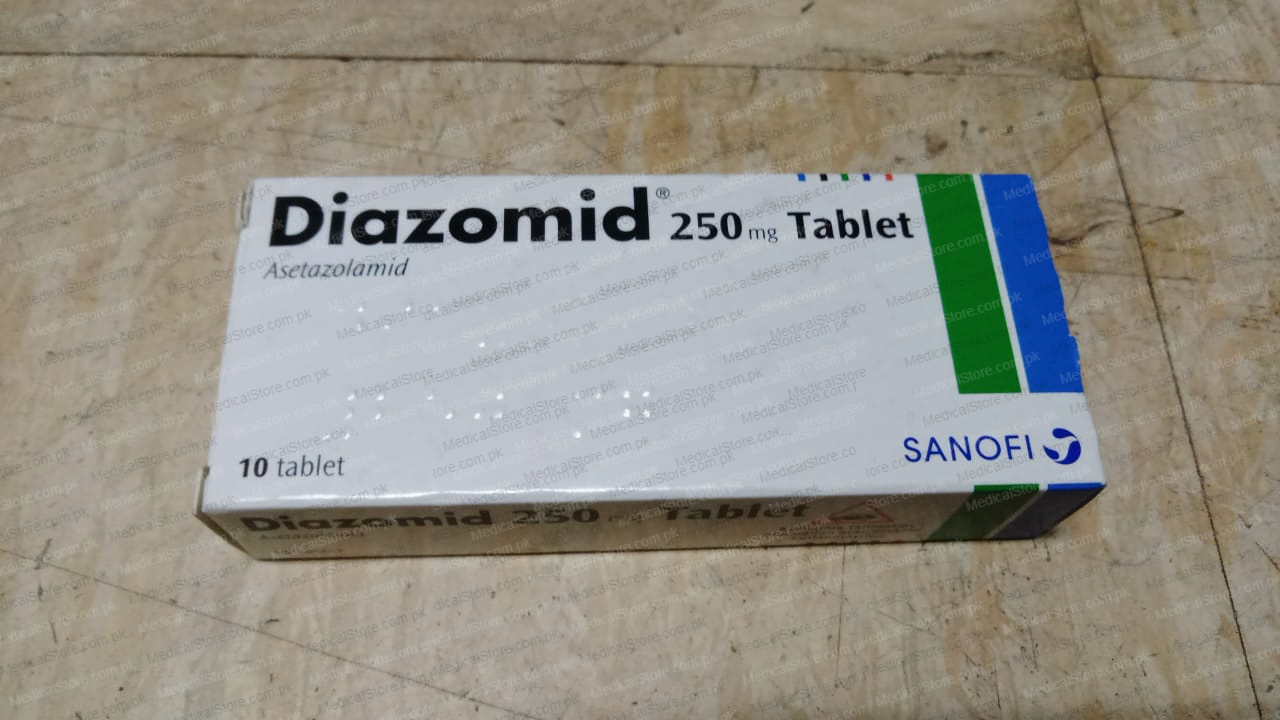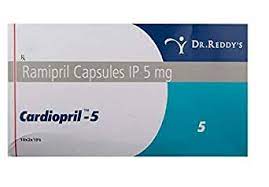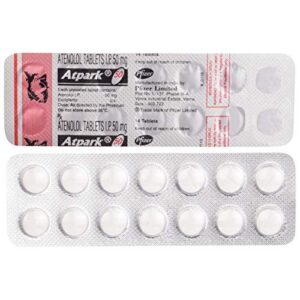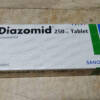This medicine blocks the actions of certain enzymes in the body. This, in turn, relieves the symptoms of altitude/mountain sickness and glaucoma, as well as reduces swelling. It also helps in controlling seizures.
Side effects
Major & minor side effects for Diamox tablet 250 mg 1_15?s
Diarrhea
Vomiting
Loss of appetite
Numbness, tingling in arms or legs severe
Increased thirst severe
Increased urination frequency severe
Drowsiness
Headache
Confusion severe
Fever and cough severe
Blood in urine severe
Yellowing of skin and eyes severe
Sore throat
Unusual bleeding or bruising severe
Ringing or buzzing in the ears severe
Altered blood glucose levels
Side or groin pain
Severe skin rash and hives severe
Change in taste/ Metallic taste
Decrease in sexual drive
Uses of Diamox tablet 250 mg 1_15?s
What is it prescribed for?
Edema
This medicine is used along with other medicines for the treatment of edema, abnormal accumulation of fluid, which may be associated with congestive heart failure or the use of certain specific drugs.
Acute mountain sickness
This medicine is used to relieve the symptoms of altitude or mountain sickness; these symptoms may include an upset stomach, a headache, shortness of breath, dizziness, drowsiness, fatigue, etc.
Glaucoma
This medicine is used along with other medicines to relieve the symptoms of open-angle glaucoma, secondary glaucoma, and preoperatively in acute angle-closure glaucoma where surgery is delayed in order to lower the intraocular pressure.
Seizure disorder
This medicine is used along with other medicines to treat centrencephalic epilepsies such as petit mal and unlocalized seizures.
Concerns
Frequently asked questions
Onset of action
The effect of this medicine can be observed within 1 to 2 hours of oral administration.
Duration of Effect
The effect of this medicine lasts for approximately 8 to 24 hours. This time is likely to vary within the mentioned range based on the dosage form of the medicine consumed.
Safe with Alchohol?
Interaction with alcohol is unknown. It is advisable to consult your doctor before consumption.
Is it habit forming?
No habit-forming tendencies were reported.
Usage in pregnancy?
This medicine is not recommended for use in pregnant women unless absolutely necessary. All the risks and benefits should be discussed with the doctor before taking this medicine.
Usage while breast-feeding?
This medicine is not recommended for use in breastfeeding women unless absolutely necessary. All the risks and benefits should be discussed with the doctor before taking this medicine. Your doctor may advise you to discontinue breastfeeding or to discontinue the drug based on your clinical condition.
When not to use?
Allergy
This medicine is not recommended for use in patients with a known allergy to Diamox tablet 250 mg 1_15?s any other medicine belonging to the sulphonamide class, or any other inactive ingredients present along with it.
Severe liver impairment
This medicine is not recommended for use in patients suffering from a severe impairment of liver function due to the increased risk of serious adverse effects.
Severe kidney impairment
This medicine is not recommended for use in patients suffering from a severe impairment of kidney function due to the increased risk of serious adverse effects.
Chronic non-congestive angle-closure glaucoma
This medicine is not recommended for use in patients suffering from a chronic non-congestive angle-closure glaucoma due to the increased risk of worsening of the patient’s condition.
Addison’s disease
This medicine is not recommended for use in patients suffering from Addison’s disease (disease of the adrenal glands) due to the increased risk of severe adverse effects.
Altered levels of sodium/potassium/chlorine ions
This medicine is not recommended for use in patients having low blood levels of sodium and/or potassium or high levels of chlorine ions due to the increased risk of worsening of the patient’s condition.
Warnings
Warnings for special population
Pregnancy
This medicine is not recommended for use in pregnant women unless absolutely necessary. All the risks and benefits should be discussed with the doctor before taking this medicine.
Breast-feeding
This medicine is not recommended for use in breastfeeding women unless absolutely necessary. All the risks and benefits should be discussed with the doctor before taking this medicine. Your doctor may advise you to discontinue breastfeeding or to discontinue the drug based on your clinical condition.
General Warnings
Other medicines
This medicine may interact with many other medicines and this may cause serious adverse effects. Hence, it is advised that you report all your current medicines including any herbs and supplements to the doctor before beginning therapy with this medicine.
Use in children
This medicine is not recommended for use in children less than 12 years of age since the safety and efficacy of use are not clinically established.
Use in elderly
This medicine should be used with extreme caution in the elderly patients since the risk of adverse effects is significantly high. Close monitoring of clinical condition, appropriate dose adjustments, or replacement with a suitable alternative may be necessary based on the patient’s condition.
Liver diseases
This medicine should be used with caution in patients with a mild to moderate impairment of normal liver function due to the increased risk of severe adverse effects. Close monitoring of liver function tests, appropriate dose adjustments, or replacement with a suitable alternative may be necessary based on the clinical condition of the patient. Use of this medicine is not recommended if the impairment is severe.
Kidney diseases
This medicine should be used with caution in patients with a mild to moderate impairment of normal kidney function due to the increased risk of severe adverse effects. Close monitoring of kidney function tests, appropriate dose adjustments, or replacement with a suitable alternative may be necessary based on the clinical condition of the patient. Use of this medicine is not recommended if the impairment is severe.
Respiratory diseases
This medicine should be used with extreme caution in patients with a history of respiratory diseases such as COPD, respiratory acidosis, etc. since it may worsen the patient’s condition. Close monitoring of lung function tests, appropriate dose adjustments, or replacement with a suitable alternative may be necessary based on the patient’s condition.
Severe allergic reactions
Use of this medicine may cause severe and life-threatening allergic reactions such as Stevens-Johnson syndrome, toxic epidermal necrolysis, etc. Report any unusual symptoms to the doctor immediately. Appropriate corrective measures, dose adjustments, or replacement with a suitable alternative may be necessary based on the clinical condition of the patient.
Driving or Operating machinery
Use of this medicine may cause symptoms such as muscle weakness, drowsiness, dizziness, visual disturbances, etc. in some patients. You are advised to avoid activities such as driving a vehicle or operating machinery if you experience any of these symptoms during treatment with this medicine.
Dosage
Missed Dose
Take the missed dose as soon as you remember. If it is almost time for the next scheduled dose, then the missed dose can be skipped. Do not use extra medicine to make up for the missed dose.
Overdose
Contact your doctor or seek emergency medical intervention if an overdose of this medicine is suspected.
Interactions
Interaction with Medicines
Dexamethasone moderate
Pimozide severe
Insulin moderate
Formoterol moderate
Alprazolam moderate
Choline salicylate severe
Digoxin moderate
Carbamazepine moderate
Amiodarone severe
Cisapride severe
Hydrocortisone moderate
Zonisamide severe
Metformin moderate
Aspirin severe
Sodium biphosphate severe
Magnesium salicylate severe
Disease interactions
severe
This medicine should be used with extreme caution in patients suffering from bone marrow depression or blood dyscrasias due to the increased risk of worsening of the patient’s condition. Close monitoring of complete blood counts is advised for these patients. Appropriate dose adjustments or replacement with a suitable alternative may be necessary based on the clinical condition of the patient.
moderate
This medicine should be used with caution in patients suffering from respiratory acidosis as well as patients with a history of lung diseases such as pulmonary obstruction, emphysema, etc. due to the increased risk of worsening of the patient’s condition. Close monitoring of lung function tests, appropriate dose adjustments, or replacement with a suitable alternative may be necessary for these patients based on the clinical condition.
moderate
This medicine should be used with caution in patients suffering from diabetes mellitus due to the increased risk of altered blood glucose levels and altered blood potassium levels. Close monitoring of blood glucose levels and electrolyte levels is recommended for these patients. Appropriate dose adjustments or replacement with a suitable alternative may be necessary based on the clinical condition of the patient.
moderate
This medicine should be used with caution in patients suffering from gout or gouty arthritis due to the increased risk of worsening of the patient’s. Close monitoring of uric acid levels is advised for these patients. Appropriate dose adjustments or replacement with a suitable alternative may be necessary based on the clinical condition of the patient.
moderate
This medicine should be used with caution in patients suffering from metabolic or hyperchloremic acidosis and in patients suffering from conditions which may contribute to acidosis such as kidney diseases, severe respiratory disorders, diarrhea, etc. since it may worsen the patient’s condition. Close monitoring of clinical condition, appropriate dose adjustments, or replacement with a suitable alternative may be necessary based on the clinical condition of the patient.
Lab interactions
General Instructions
Take this medicine exactly as prescribed by the doctor. Do not take it in larger or smaller quantities than recommended. Ensure that the course of treatment is completed. Do not stop the use of this medicine without consulting your doctor. Contact your doctor if you experience any persistent symptoms such as fever, severe headache, unusual bleeding or bruising, coffee-colored vomit, etc.
Other details
Can be taken with or without food, as advised by your doctor
To be taken as instructed by doctor
May cause sleepiness
References
practo.com/ –
Acetazolamide [Internet].
Available from: https://www.practo.com/medicine-info/acetazolamide-546-api
[cited 04 september 2019].
11 Sep 2018
pubchem.ncbi.nlm.nih.gov –
Acetazolamide [Internet].
Available from: https://pubchem.ncbi.nlm.nih.gov/compound/acetazolamide#section=Top
[cited 04 september 2019].
2019-08-31
dailymed.nlm.nih.gov –
ACETAZOLAMIDE [Internet].
Available from: https://dailymed.nlm.nih.gov/dailymed/drugInfo.cfm?setid=a0dc2da1-f42f-483a-83de-56ad81b728df
[cited 04 september 2019].
May 18, 2018













Reviews
There are no reviews yet.